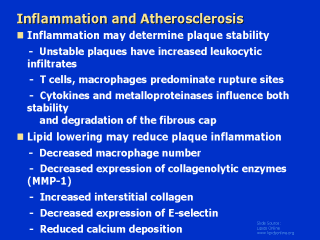 |
Why study
inflammation in heart disease? Two general hypotheses emerging from the basic science
community have driven this research. The first is the concept that inflammation itself may
determine plaque stability. Unstable plaques have increased leukocytic infiltrates in
them, and T-cells and macrophages predominate at the rupture sites in these plaques. Also,
cytokines and metalloproteinases may influence plaque stability and the degradation of the
fibrous cap. But in addition to the idea that atherosclerosis is fundamentally an
inflammatory disorder is the recognition in the basic science literature that lipid
lowering in general may reduce plaque inflammation. That is to say, experimental studies
have now demonstrated reduced macrophage number within atherosclerotic plaques treated
with lipid-lowering statin therapy as well as decreased expression of collagenolytic
enzymes and the attenuation of other markers of the inflammatory process. References:
Libby P. Molecular bases of the acute coronary syndromes. Circulation 1995;91:2844-2850.
Website
Ross R. Atherosclerosis—an inflammatory disease. N Engl J Med 1999;340:115-126.
Website |
